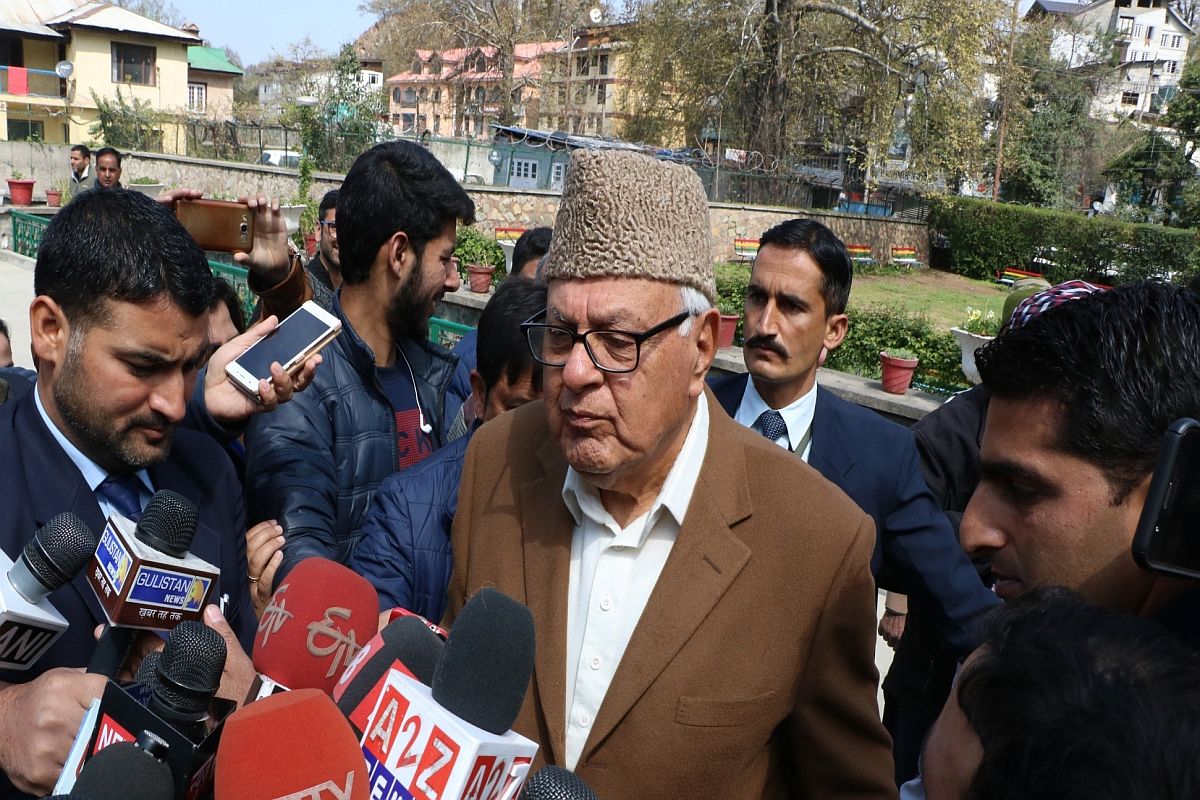Jammu and Kashmir National Conference Chairman Farooq Abdullah on Tuesday said that he is being “confined to his home” hours after Union Minister Amit Shah told the Lok Sabha that the senior politician “has neither been detained not arrested”.
Abdullah, who was also a former Jammu and Kashmir CM, made an appearance before the media in Srinagar a day after Article 370 was scrapped by the Government. He accused Home Minister Amit Shah of lying and said he has been placed under house arrest.
Advertisement
Speaking to news channels, he said: “I am not allowed to go out of the house.”
“Farooq Abdullah has neither been detained nor arrested. He’s at his home, out of his own free will,” Shah had said during a debate on a resolution to scrap Article 370 in Jammu and Kashmir, that grants special status to the state.
Shah was replying to the opposition members questioning Abdullah’s absence from the high-profile debate in the Parliament.
Reacting to the government’s decision to scrap Article 370, Abdullah said that it was “unconstitutional”.
“It is the dictatorship by the Modi government. We have never been the ones who want to separate nor do we want to separate from this nation. But, don’t take away our honour and dignity, we are not slaves,” he said.
“Dictatorial authority has been evoked and not a democratic one. I don’t know how many have been arrested. Nobody is allowed to come in or go out, we are under house arrest,” he said.
The Opposition including the Congress had raised fears that Farooq Abdullah might have been detained.
NCP’s Supriya Sule and DMK’s Dayanidhi Maran sought to know why the National Conference leader was not present on a day when a crucial legislation related to his state was being discussed.
“I sit on seat 462, Farooq Abdullah sits on seat 461. He’s elected from J-K, we can’t hear him today. This debate will be incomplete, if you ask me,” Supriya Sule said.
To this, Union Home Minister Amit Shah replied that Abdullah was “at his home, out of his own free will”.
DMK MP, Dayanidhi Maran also hit out at the BJP government saying that Farooq Abdullah, a member of the House was “missing” and that he was “arrested”.
He further asked Lok Sabha Speaker Om Birla to act neutral and protect the members of the House.
The Kashmir valley is under an unprecedented security clampdown as restrictions have been imposed in the state following the Centre’s decision to scrap Article 370.
Former Jammu and Kashmir chief ministers Omar Abdullah and Mehbooba Mufti and Jammu and Kashmir People’s Conference chairman Sajad Lone are under house arrest since early Monday morning.
All educational institutions have been closed till further orders and all Kashmir University exams have been postponed without specifying the next date. Mobile internet services have been snapped.
Soon after the massive build-up in the state, the Centre on Monday scrapped Article 370 of the Indian Constitution. President Ram Nath Kovind has signed the notification to scrap the Article.
Under the Jammu and Kashmir Reorganisation Bill, 2019, the Centre has planned to bifurcate the state into two Union Territories – one, Jammu and Kashmir with an Assembly and the other, Ladakh without one.
Repealing Article 370 and Article 35A has long been one of the core BJP promises and the demand for its abrogation had risen after the Pulwama terror attack.
Article 370 grants special status to Jammu and Kashmir and limits Parliament’s power to make laws concerning the state. It was incorporated in India’s Constitution in October 1949. It also gives power to the state legislature to define Jammu and Kashmir’s residents and their privileges.









